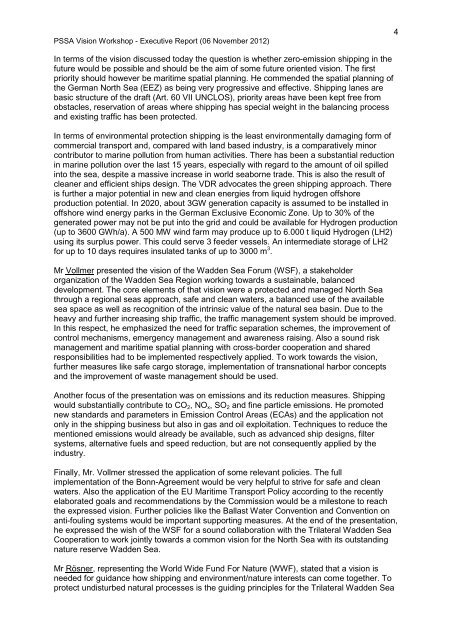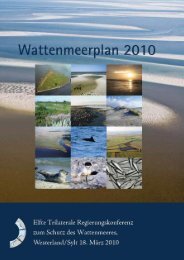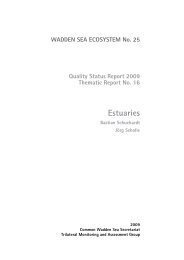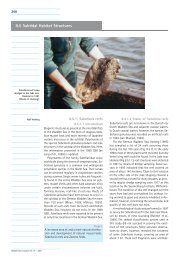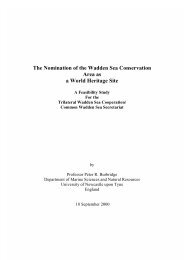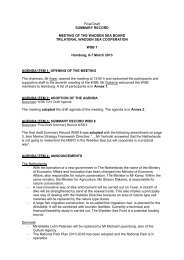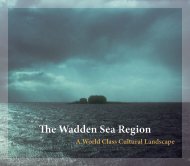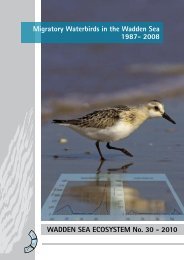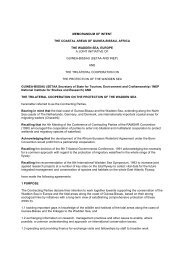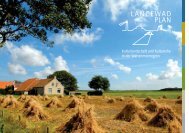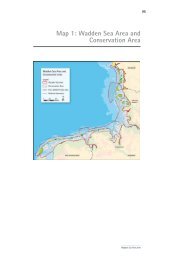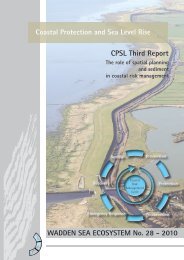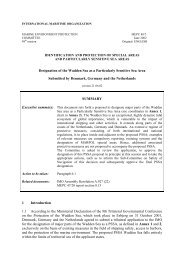PSSA Workshop Report 2012 - Trilateral Wadden Sea Cooperation
PSSA Workshop Report 2012 - Trilateral Wadden Sea Cooperation
PSSA Workshop Report 2012 - Trilateral Wadden Sea Cooperation
You also want an ePaper? Increase the reach of your titles
YUMPU automatically turns print PDFs into web optimized ePapers that Google loves.
<strong>PSSA</strong> Vision <strong>Workshop</strong> - Executive <strong>Report</strong> (06 November <strong>2012</strong>)<br />
4<br />
In terms of the vision discussed today the question is whether zero-emission shipping in the<br />
future would be possible and should be the aim of some future oriented vision. The first<br />
priority should however be maritime spatial planning. He commended the spatial planning of<br />
the German North <strong>Sea</strong> (EEZ) as being very progressive and effective. Shipping lanes are<br />
basic structure of the draft (Art. 60 VII UNCLOS), priority areas have been kept free from<br />
obstacles, reservation of areas where shipping has special weight in the balancing process<br />
and existing traffic has been protected.<br />
In terms of environmental protection shipping is the least environmentally damaging form of<br />
commercial transport and, compared with land based industry, is a comparatively minor<br />
contributor to marine pollution from human activities. There has been a substantial reduction<br />
in marine pollution over the last 15 years, especially with regard to the amount of oil spilled<br />
into the sea, despite a massive increase in world seaborne trade. This is also the result of<br />
cleaner and efficient ships design. The VDR advocates the green shipping approach. There<br />
is further a major potential in new and clean energies from liquid hydrogen offshore<br />
production potential. In 2020, about 3GW generation capacity is assumed to be installed in<br />
offshore wind energy parks in the German Exclusive Economic Zone. Up to 30% of the<br />
generated power may not be put into the grid and could be available for Hydrogen production<br />
(up to 3600 GWh/a). A 500 MW wind farm may produce up to 6.000 t liquid Hydrogen (LH2)<br />
using its surplus power. This could serve 3 feeder vessels. An intermediate storage of LH2<br />
for up to 10 days requires insulated tanks of up to 3000 m 3 .<br />
Mr Vollmer presented the vision of the <strong>Wadden</strong> <strong>Sea</strong> Forum (WSF), a stakeholder<br />
organization of the <strong>Wadden</strong> <strong>Sea</strong> Region working towards a sustainable, balanced<br />
development. The core elements of that vision were a protected and managed North <strong>Sea</strong><br />
through a regional seas approach, safe and clean waters, a balanced use of the available<br />
sea space as well as recognition of the intrinsic value of the natural sea basin. Due to the<br />
heavy and further increasing ship traffic, the traffic management system should be improved.<br />
In this respect, he emphasized the need for traffic separation schemes, the improvement of<br />
control mechanisms, emergency management and awareness raising. Also a sound risk<br />
management and maritime spatial planning with cross-border cooperation and shared<br />
responsibilities had to be implemented respectively applied. To work towards the vision,<br />
further measures like safe cargo storage, implementation of transnational harbor concepts<br />
and the improvement of waste management should be used.<br />
Another focus of the presentation was on emissions and its reduction measures. Shipping<br />
would substantially contribute to CO 2 , NO x , SO 2 and fine particle emissions. He promoted<br />
new standards and parameters in Emission Control Areas (ECAs) and the application not<br />
only in the shipping business but also in gas and oil exploitation. Techniques to reduce the<br />
mentioned emissions would already be available, such as advanced ship designs, filter<br />
systems, alternative fuels and speed reduction, but are not consequently applied by the<br />
industry.<br />
Finally, Mr. Vollmer stressed the application of some relevant policies. The full<br />
implementation of the Bonn-Agreement would be very helpful to strive for safe and clean<br />
waters. Also the application of the EU Maritime Transport Policy according to the recently<br />
elaborated goals and recommendations by the Commission would be a milestone to reach<br />
the expressed vision. Further policies like the Ballast Water Convention and Convention on<br />
anti-fouling systems would be important supporting measures. At the end of the presentation,<br />
he expressed the wish of the WSF for a sound collaboration with the <strong>Trilateral</strong> <strong>Wadden</strong> <strong>Sea</strong><br />
<strong>Cooperation</strong> to work jointly towards a common vision for the North <strong>Sea</strong> with its outstanding<br />
nature reserve <strong>Wadden</strong> <strong>Sea</strong>.<br />
Mr Rösner, representing the World Wide Fund For Nature (WWF), stated that a vision is<br />
needed for guidance how shipping and environment/nature interests can come together. To<br />
protect undisturbed natural processes is the guiding principles for the <strong>Trilateral</strong> <strong>Wadden</strong> <strong>Sea</strong>


